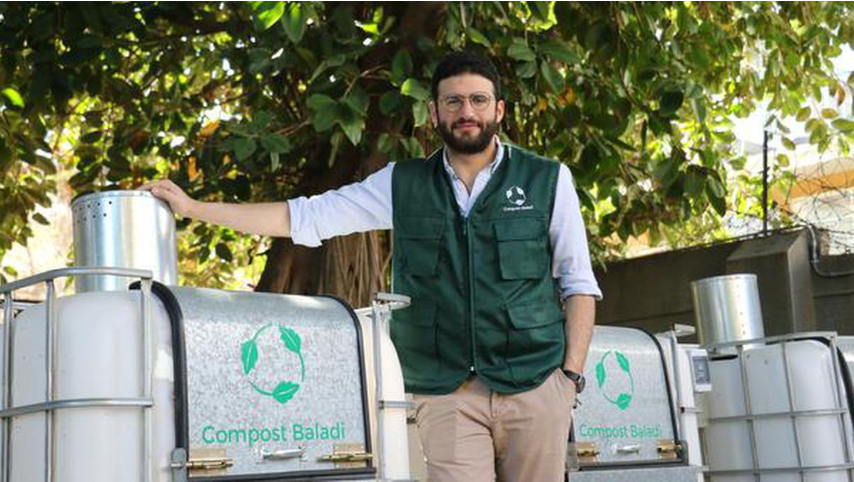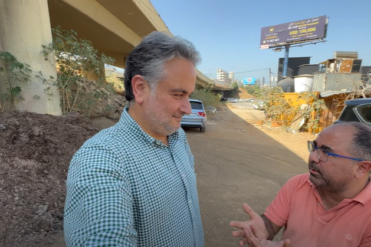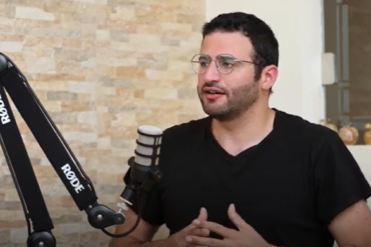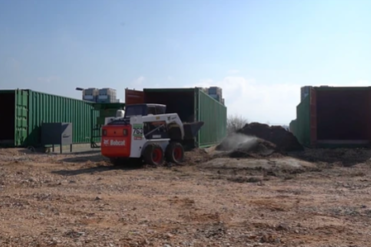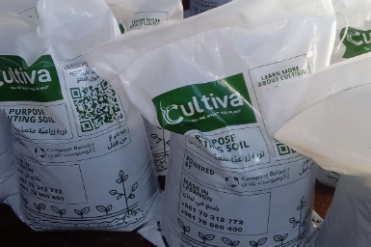More than three years after the waste crisis in Lebanon, a new crisis looms. Composting organic waste could be part of a sustainable solution to waste management.
About 20 km north of Beirut, Dalida Sneifer and Marc Beyrouthy walk among piles of pallets and tarpaulins, sinking into the rainwater-soaked soil. “If only you knew what land costs here in Kaslik – building here would generate millions in profits. But the management [of Kaslik Holy Spirit University, or USEK] has agreed to build a waste management center instead,” says Beyrouthy, a professor and member of the USEK Green Committee.
The Green Committee was founded in 2016, one year after the beginning of a serious waste crisis in Lebanon, caused by the closure, without a backup plan, of the Naamé landfill, south of Beirut. Beyrouthy notes, “To students outraged by the images of waste piling up on the streets of the capital and its suburbs, in rivers and forests, we said: ‘What happens here, at USEK, it’s not the state’s responsibility, it’s yours. If you start sorting waste, we can show that a 10,000-person community like ours can take action, find solutions and set an example.’”
Today, the commitment is as real as the margin for progress. “Only 50 of the 350 kg of organic waste produced per day at USEK is actually transformed into compost,” says Sneifer, the committee coordinator. This is mainly due to the fact that the four kitchens on campus have refused to sort their waste. However, the Green Committee is now applying pressure to make sorting mandatory. “We have to do better, of course, but there’s at least 50 kg of organic waste that won’t end up in the sea or in nature! They can also replace expensive and polluting chemical fertilizers,” says Beyrouthy.
According to a 2014 report published by Sweepnet (the Regional Network for the Exchange of Information and Expertise on Solid Waste in the Mashreq and Maghreb Countries), 15 percent of the waste produced in Lebanon is composted, eight percent recycled, 48 percent landfilled and 29 percent end up in illegal garbage pits. Composting is a major challenge in Lebanon because 52 percent of the country’s waste is organic.
Aware of the situation, Sneifer is working to turn students into eco-citizens “before,” she says, “it’s too late.” Marc Aoun, co-founder of Compost Baladi, the company that installed compost boxes at USEK, aims to make this practice accessible to everyone.
“Our objective is to inspire behavior change and offer relatively cheap solutions [a 200-liter composting box costs USD 220, while a large 1,100-litre composting box for a building costs USD 650] while ensuring that there are no nuisances, such as odors or flies,” explains Aoun, whose company, founded in 2017, has only recently become profitable.
Compost Baladi employs six full-time and four part-time employees and has already installed about 50 Earth Cube composting units at the American University of Beirut (AUB), as well as in companies, villas and a Syrian refugee camp in Ersal, eastern Lebanon. It also works with municipalities.
“Even some professors at the American University of Beirut, despite their commitment to environmental protection, find it difficult to actually compost, mainly because it requires them to change their habits,” says the 25-year-old, standing in front of compost crates installed near the university professors’ houses. “We try to set up an integrated system, so that the act of composting is as close as possible to the act of throwing garbage in the trash bin.”
At the AUB campus, novice composters simply throw their sorted organic waste into the boxes and cover it with dead leaves that will act as a biofilter and prevent flies from entering. A small motor sends air into the box at regular intervals to allow the decomposition of waste by aerobic bacteria and the formation of compost without added water.
“Our goal is for nobody to be able to say it’s impossible to compost,” says Aoun, who regrets his fellow citizens’ apathy. “Since the mountains of garbage have disappeared from their daily lives, they feel that the problem of waste management has been solved,” he says.
However, nothing was fundamentally solved after 2015, and a new waste crisis is looming with the impending saturation of the Bourj Hammoud landfill, which was set up as an emergency measure on the Beirut coast after the 2015 crisis. Reopening the Naamé landfill or installing an incinerator in Beirut are some of the options being discussed.
Aoun is scheduled to meet Lebanon’s new Environment Minister, Fadi Jreissati, to convince him of the benefits of composting. In the meantime, he’s trying to raise awareness among different municipalities, including Beirut. “The president of the municipality wants 200 of the 800 tonnes of waste Beirut produces per day to be recycled and composted,” he says. “We talked with him about implementing a pilot project to compost 1.5 tonnes of organic waste per day. If it works, it will serve as an example and could be replicated.”
This article is being published as part of Earth Beats, an international and collaborative initiative gathering 18 news media outlets from around the world to focus on solutions to waste and pollution. In partnership with the Agence universitaire de la Francophonie
Read more: https://today.lorientlejour.com/article/1167093/composting-in-lebanon-one-tonne-at-a-time.html
